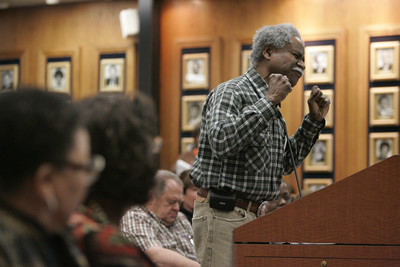School budget plan advances
After a discussion called "emotionally repugnant" by Superintendent Walt Rulffes, Clark County School Board members Thursday night voted 5-1 to accept economic assumptions requiring $120 million in budget cuts for the 2009-10 school year.
If the school district proceeds with the recommended cuts, as many as a thousand jobs would be eliminated, including 260 administrative jobs and cuts in teaching and support staff.
"These cuts will hurt kids," School Board member Carolyn Edwards said. "I'm saddened, but that's where we are."
School Board member Larry Mason was the lone opposition in the 5-1 vote, arguing that Nevada has underfunded education for decades. The School Board should not validate further cuts of 14 percent for next year's budget, he said.
Rulffes agreed with Mason in principle but said the board was bound by law to pass a balanced budget.
There was some hope that recommended cuts might not have to be made because the School Board does not have to approve a final budget until May.
Funding conditions could change, depending on action taken by the Legislature in 2009.
Because of the worsening economic climate, Jeff Weiler, the chief financial officer, said School Board members need "to prepare for the worst and hope for the best."
To spare the classroom as much as possible, the district plans to cut its central administrative staff and budget by 13 percent, saving $35.5 million.
The district would reduce its fund balance by half, freeing up $22 million for immediate expenses. That move required the board to waive a policy of saving 2 percent of its current budget for the next year. So in 2009-10, the district will save 1 percent, which Weiler acknowledged will not look good to creditors.
The district will need to shore up its savings before it seeks more bonds for school construction.
Weiler identified another $12 million in cuts: $2.5 million in early retirement incentives; $2 million for support staff at elementary schools; $2.7 million for teacher mentors; $4 million for teacher purchasing cards; and a $1.7 million reduction in athletics, which could mean reductions in games and schedules.
An additional $57 million in cuts would affect the classroom more directly. That includes reducing staffing at all schools by 3 percent, eliminating one to two jobs per school. That would save about $27 million. Each school would be given latitude on how to make the cuts.
Some schools might cut literacy specialists, while others might choose to cut librarians.
Because the choices are so controversial, some principals have told School Board member Terri Janison that they did not want the responsibility.
The district would reduce its permanent substitute teachers by 60 percent, saving $6.8 million, and cut out some administrative staffing for secondary schools, saving $2.7 million.
An academic program that helps about 3,000 underprivileged teens prepare for college would be eliminated, saving $1.9 million.
But school officials hope AVID, which stands for Advancement Via Individual Determination, could be replicated by other programs.
The most controversial proposal was eliminating block scheduling, which allows high school students to take more electives.
Parents such as Todd Faranda spoke out in favor of block scheduling, saying his son could not even get into a chemistry class this year at Chaparral High School.
School Board members Janison and Ruth Johnson also urged the district to spare block scheduling.
Johnson said it was unfair to protect athletics while eliminating opportunities for students to take more classes.
Seventeen high schools offer block scheduling. Rulffes and School Board President Mary Beth Scow questioned whether block scheduling was effective academically, noting that some schools that offer it have not performed well in mathematics.
Cutting the program would save $11 million and reduce staffing by 160 positions. School staff seemed receptive to a proposal by Janison that schools be given the option of keeping block scheduling if they can maintain it with the reduced staffing.
In addition, a committee of principals will be asked to recommend an "activity fee" to increase revenue for high schools.
School Board members did not vote on the proposed cuts. The discussion was only intended to give staff guidance.
"I think I got the gist," Rulffes said.
Contact reporter James Haug at jhaug@reviewjournal.com or 702-799-2922.
CLARK COUNTY SCHOOL DISTRICT BUDGET CUTS, BASED ON ASSUMPTION THAT $120 MILLION MUST BE AXED Cutting 260 administrative positions, saving $32 million Cutting central and regional administration budgets, saving $3.5 million Eliminating early retirement incentives, saving $2.5 million Not saving $22 million from end of year fund balance Reducing administrative positions at secondary schools, saving $2.7 million Cutting teacher mentors, $2.7 million Cutting teacher purchasing cards, $4 million Cutting 15 percent from athletic programs, mostly in game scheduling reductions, $1.7 million Ending block scheduling, $11 million Cutting AVID, student support program, $2 million Reducing school staffing allocations, $27.1 million Reducing school support staff, $2 million Replacing permanent substitute teachers with regular substitutes, $6.8 million





























